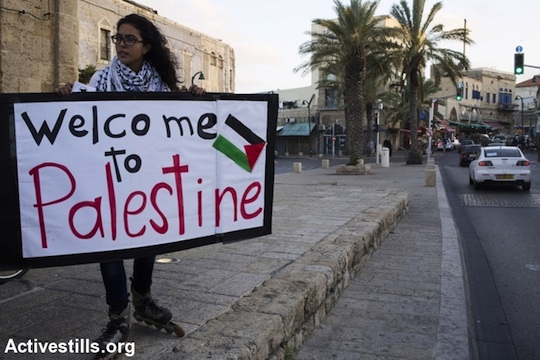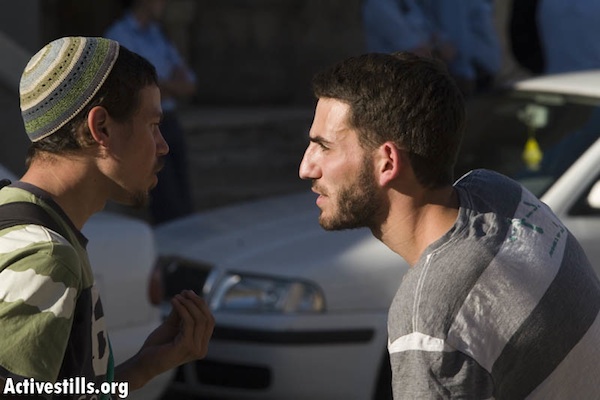What kind of democratic struggle excludes people based on their ethno-religious or national identities, and what kind of liberation is really possible when it concerns only one nation and its nationalism?
By Benjamin Birely
On the evening of May 1st, 1921 the Jaffa-based Socialist Workers Party (MPS), later the “Palestine Communist Party” and a forerunner of today’s Maki, organized a small, unauthorized march between Jaffa and Tel Aviv. Participants marched under a banner in Yiddish that triumphantly called for the establishment of “Soviet Palestine.” Arabic filers were distributed to onlookers. The march ran through Manshiyya, an Arab neighborhood erased literally and metaphorically from the post-48 Israeli consciousness like so many others, on its way to Tel Aviv. When the peaceful rally collided with the large, authorized May Day celebrations of the Zionist, Labor Unity party (Ahdut HaAvoda) with its Hebrew-only language policy, a violent brawl broke out. Police sought to violently disperse the MPS activists. Some bystanders, Jews and Arabs, intervened to protect the revolutionary activists.
Rumors of the fighting spread like wildfire throughout Jaffa and, believing that Arabs were being targeted and attacked, some men organized into armed groups to allegedly defend the Arab population of Jaffa. Horrifying reports soon followed of Arab men looting Jewish businesses and attacking unarmed Jewish pedestrians. Brutal details of Jews, including young children, being murdered in their homes and on the streets shocked and terrified the Jewish populations of Jaffa and Tel Aviv. British High Commissioner Herbert Samuel declared a state of emergency, imposed press censorship, and called for reinforcements. The anti-Jewish violence continued for days and spread quickly to neighboring areas.

By May 7th 1921, most of the Jewish population of Jaffa had fled, taking refuge in makeshifts tents on the beach between Jaffa and Tel Aviv, or in neighboring Tel Aviv itself. The Haycraft Commission Report, issued shortly after the riots, found that “the racial strife was begun by Arabs, and rapidly developed into a conflict of great violence between Arabs and Jews, in which the Arab majority, who were generally the aggressors, inflicted most of the casualties.” The British Authorities and particularly the Zionist leadership also blamed the Socialist Workers Party.
In reading Rami Younis’ piece on how the Israeli-Left can’t be a partner in the Palestinian struggle for liberty and democracy, I couldn’t help but wonder what kind of democratic struggle excludes people based on their ethno-religious or national identities, and what kind of liberation is really possible when it concerns only one nation and its nationalism. In thinking about the Palestinian activist in Younis’ article who claims Jaffa for his nation – and his nation alone – I wonder what my or any other Jews’ place is in his Palestinian, Arabic Jaffa.
This land that we all live in, from the River to the Sea, has political and economic realities shaped by over a century of colonialism, massive immigration, expulsions, warring nationalisms, violence, and an unjust distribution of resources. Our everyday reality echoes events such as the Jaffa riots of 1921, or the Irgun’s offensive on Jaffa in 1948. None of us, neither Israeli Jew nor Palestinian Arab, exist in a vacuum disconnected from our histories or our neighbors’ histories. None of us is disconnected from the events that happened in the same streets that we walk today and none of us is disconnected from the Jews and Arabs who have been murdered, harassed or expelled for no other crime than their national identities. This is precisely why nationalist calls for a Jewish-only Israel or an Arab-only Palestine are not only old ideas not worth recycling, they are also dangerous and racist fantasies.
Read: The Jewish-Israeli Left can participate in the Palestinian struggle, but not as a partner
The Palestinian who calls out: “Yafa Arabiyeh Falastaneeyeh!” (“Jaffa is Arab-Palestinian!”) in Younis’ article, is saying: “Yaffa belongs to us! She is ours and only ours!” The Jewish activist who took issue with the nationalist chant shouldn’t have reprimanded him. She should have simply asked: What about me? What about the Jews who live and work in Jaffa today? What about thousands of years of Jewish history in Jaffa? What about Jaffa being mentioned in the Hebew Bible, Midrash, and the Talmud? What about the 1921 riots? Is it all erased in the name of liberating Palestine? Will a ‘liberated’ Jaffa and Palestine even include Jews?
For anyone interested in ending the occupation (whether she is referring to ’48 or ’67) and building new political and economic realities between the River and the Sea, Jewish-Arab partnership is the only possibility. If for no other reason than the fact that none of us are going anywhere. The young man who yelled: “Yaffa Arabiyeh Falastaneeyeh,” the Jewish activist who took him aside, Rami Younis and myself: none of us live rootless and artificial lives here; we all belong to this place.

In saying that the Palestinian struggle for freedom and democracy may include minimal Jewish participation “for now,” but is not open to Jewish partnership, Younis is excluding over half of the population between the River and the Sea from involvement in determining all of our futures. In “understanding” Palestinian activists who want to exclude Jews from demonstrations solely based on their ethno-religious background or identity, he is “understanding” hateful exclusion based on identities we do not choose. In agreeing that “Jaffa is Palestinian,” he dismisses the existence of every Jew in Jaffa as either superfluous or, even worse, as a colonial aberration. He appears to be advocating for a racist nationalism, disguised as liberation, which dreams of a Palestine that can never exist: a Palestine without Jewish-Arab partnership.
Unlike colonial conquerors, Jews have a religious and national connection to this land that stretches back thousands of years. This isn’t propaganda; it is a historical reality that cannot be denied. Of course, it is a history that has been used to justify crimes and injustices against Palestinians, but the history itself cannot be carelessly swept under the rug to suit Younis’ nationalist narrative. Younis has decided that Jewish-Arab partnership is impossible, but not because I or any other Jew refuses to acknowledge our history. It is because he refuses to see Jews as a real and natural part of this place.
Jaffa is neither Palestinian nor Arab; how can it be when so many non-Arabs live and work there? How can it be with a history thousands of years older than the first Arab conquests of this land? Neither is it Jewish, how could it be? It is a city – not a nationality or ethnicity. Jaffa belongs to all of its residents, and they all belong to Jaffa. Just like Eretz Yisrael; just like Falasteen.
The author is an American-Israeli in love with Jaffa, who believes in Jewish-Arab partnership from all segments of Israeli and Palestinian societies.
Read more:
The Israeli Left can participate in the Palestinian struggle, but not as a partner
Grappling with intolerance at demonstrations: a dialogue
Jaffa, habibti, our relationship is complicated

